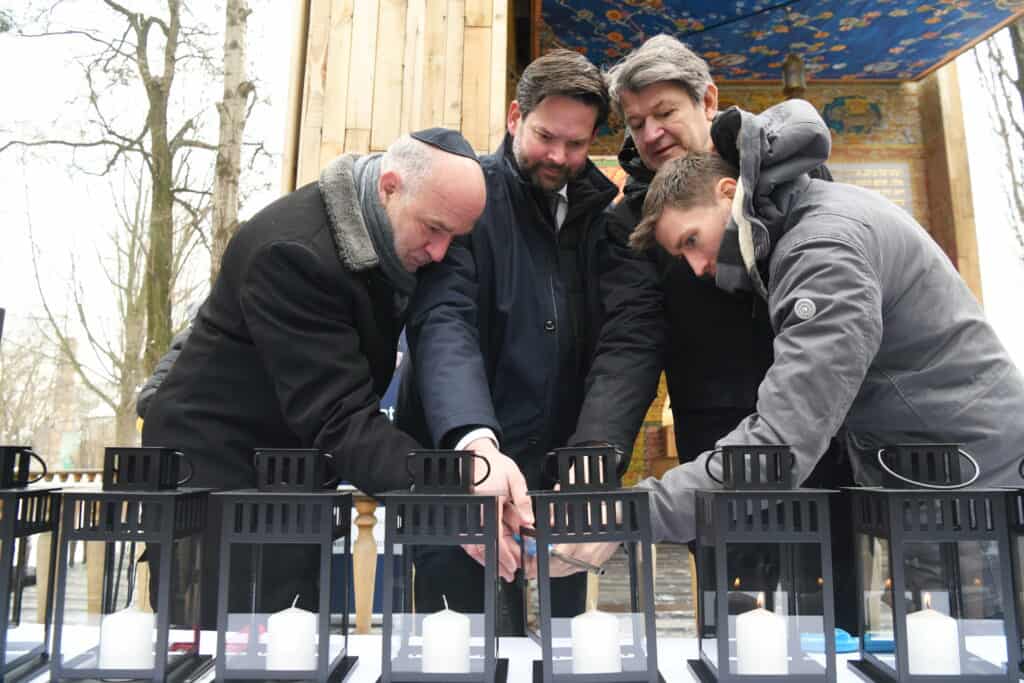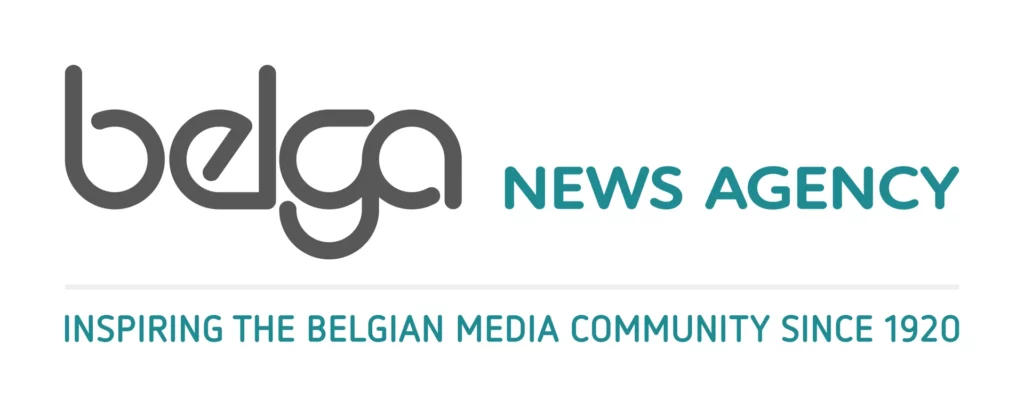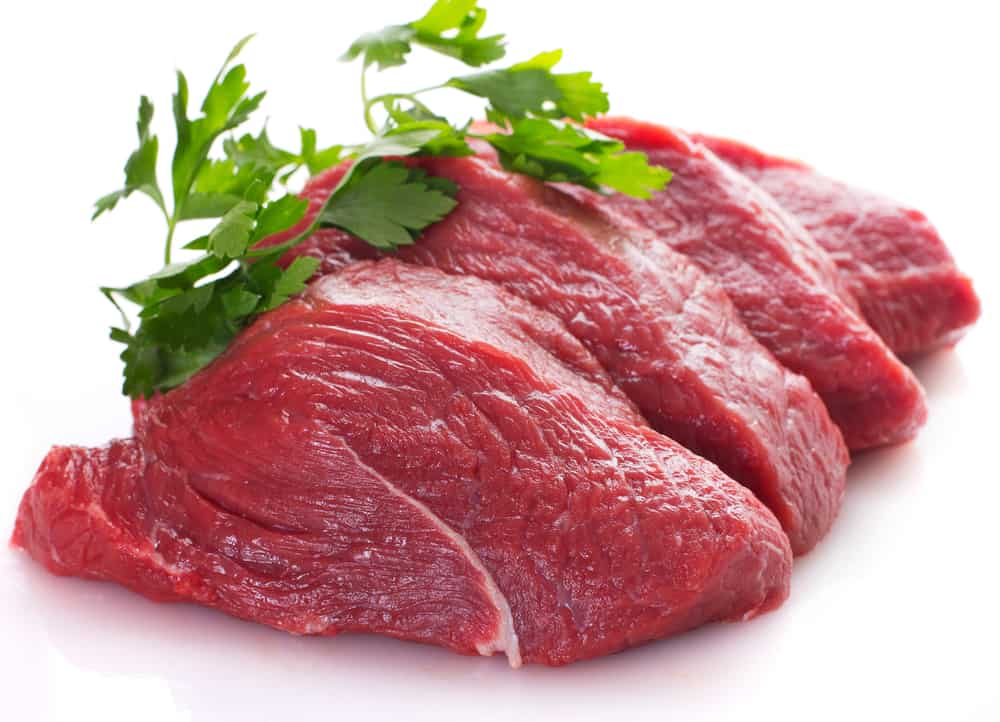Moins connu qu’Auschwitz, le site symbolise “la Shoah par balles” à l’Est.

Moins connu qu’Auschwitz, le site symbolise “la Shoah par balles” à l’Est.

The mayor of Brussels Philippe Close cleaned some pavement stones of the Belgian capital this Wednesday afternoon, April 27. They were not simple stones, though. They were “Stolpersteine”, known in English as stumbling stones: each engraved brass block is dedicated to the memory of a victim of the Nazi regime, usually placed in front of the victim’s former residence.
“These stones are very important for Brussels, because they are not only figures, they are names, they are families, children, men, women. They lived in this neighbourhood. And these pavements are very symbolic of the people who lived here,” said Close to Belga News Agency.
“We do it together with the European delegation of the Jewish community, but also throughout the territory of Brussels, with this symbolic act. It’s very important to show that in Brussels everybody has a place,” added the mayor.
In Brussels, the cleaning event was organized by the European Jewish Association (EJA) to commemorate the Holocaust Remembrance Day (Yom HaShoah) that this year started Wednesday evening April 27 through Thursday April 28.
“We have to remember all those who did not come back from Auschwitz. And one of the manners to do it is the Stolpersteine that we clean today,” explained Régine Suchowolski-Sluszny, Belgian Holocaust survivor from Antwerp.
“Because a lot of people do not have a place where they are buried, because they burnt,” added Régine with emotion. “It has to go on living on everybody’s soul that these people were murdered for nothing. Only because they had a Jewish mother,” she said to Belga News Agency.
Gratitude to Belgians
According to Regine, who presides the Jewish Organization in Flanders (FJO) in Antwerp, the Belgian people saved about 5000 Jewish children from the nazi regime. “50% of the Jewish people living in Belgium were saved. If you compare it to Holland, there was not even 20%. So the Belgian people did a very good job and we have to be grateful for that.”
In her speech at the opening event at the Jewish Museum of Belgium, she reminded the Belgian Christian couple that helped her family to scape the nazis, loved her and took care of her until she could reunite with her parents. She was only two years and a half then.
Régine defends that people should stand up against all forms of hate, intolerance and anti-Semitism. “People have to denounce it and not accept what is going on today,” she said to Belga News Agency.
“The world has to remember what happened. And we see today, sadly enough, that other people are suffering again; it’s not the same, because we can’t compare the Shoah to anything else, but too many people are suffering today and people are forgetting too quickly even what happened one hundred years ago,” Regine remarked.
Shining memory
In total, 90.000 stones can be found in Europe, from Spain to Finland. They were conceived by the German artist Gunter Demnig in 1993 and today the initiative follows up the international student-led “Make Their Memory Shine” movement, aiming to clean all Stolpersteine in a “pro-active manner”, mixing commemoration, volunteering and education.
The Chairman of the EJA rabbi Menachem Margolim, reminded that the nazis forced Jewish people to clean the streets.
“Today we clean the stones of the streets to make the memory of those Jewish people shine,” he said.


The EJA welcomes the EU Attorney General’ opinion that individual member state moves to ban kosher slaughter run contrary to EU law and are a breach of commitments to respect freedom of religion. We hope that the European Court of Justice will echo his opinion in due course.




“The Dutch government is spearheading a crucial investigation into the fate of Jewish property looted during the Holocaust. However, a disheartening reality emerges as a staggering 80 cities, towns and villages in the Netherlands decline to participate in this vital mission,” according to Dutch Chief Rabbi Binyomin Jacobs.

By Rabbi Menachem Margolin (05/02/2014)
Recent months have seen revived attempts by politicians, both in the European Parliament and as domestic level in various EU member states, to legislate on the sacred ritual tradition of Jewish animal slaughter. A September draft written declaration in the European Parliament called on the Commission to instigate special labelling for the meat of ritually slaughtered animals, to eliminate “misleading omissions liable to distort the transactional decisions of consumers”, whilst claiming that consumers should have the right to ensure the meat they are purchasing comes from animals that have been slaughtered with proper regard to animal welfare.
The Polish parliament dismissed a government-sponsored bill to protect the religious slaughter of animals, whilst their Lithuanian counterparts voted in legislation aimed at protecting the practice.
The ability to eat kosher meat is a fundamental right for all people. The fact is that many people prefer to eat kosher meat simply for health reasons, regardless of religious beliefs or considerations.
Of course, everyone must respect the public’s right to know; there is no question that it is fair and correct to require listing a food’s ingredients on the label. Nevertheless, it is clear that the calls of a number EU member states to label meat slaughtered according to religious ritual as such, sets off many alarms – history has shown that such demands have led to large-scale bloodshed (human, not animal blood).
Did these pluralistic liberals, before attempting to isolate their neighbours who subscribe to different lifestyle choices, ascertain whether or not traditional kosher slaughter causes more harm or abuse to animals, G-d forbid, than other methods of slaughter? Had they conducted that research, they would have discovered that countless objective authorities agree that religious slaughter – both by Jewish and Muslim doctrine – is the least painful method of animal slaughter. In fact, the Jewish kosher slaughter code requires that no less than thirteen steps be taken before an animal may be slaughtered. One of these requirements is to verify that the animal is not hungry or thirsty when it is slaughtered.
If those “enlightened” individuals were truly concerned about animal rights, they would declare war on all forms of slaughter. Animal rights are not guaranteed by disparaging one particular method of killing animals, whilst allowing others to continue unabated, including hunting or factory slaughter?
And if allowances must be made, considering most people consume meat top some degree, and our decision-makers choose instead to legislate on the most humane method of slaughter (is it humane to put a living thing to death in any manner?), they ought to worry about the conditions in which animals are raised before their slaughter. They should be concerned about ensuring
sufficient living space, quality and quantity of food, medications, comfort level during transportation for slaughter, quality and wattage of the electric shocks administered for slaughter, the number of shots needed to kill an animal, and more.
The number of animals slaughtered each year according to kosher standards is less than 1 percent of those slaughtered by other methods. If the issue in question here is the public’s right to know, what logic is there in demanding that kosher meat be labelled, without addressing the 99.9 percent of the slaughtered animals in the country?
For the past 3,000 years, the Jewish people have had to deal constantly with innumerable attempts to infringe upon their freedom of religion – a liberty that has long been established as a basic human right.
As well as being illogical and inconsistent from the perspectiveof animal rights, labelling kosher meat will give ammunition to anti-Semites to attack Jewish tradition. It is very disturbing to note that people who claim to be enlightened liberals are advancing this motion. These people who present themselves as pluralists are, perhaps unwittingly, waging an all-out war against anyone who chooses to live differently from them.
In the 1930s, things began with the burning of books and ended with the burning of human beings. I shudder to think how this new discrimination, beginning with methods of animal slaughter, will end.
It’s a challenging time for Jewish communities in Europe. Anti-Semitism is on the rise as populism and the politics of the lowest common denominator are gaining traction. Our communities often need round the clock protection and our practices and customs such as keeping Kosher are under pressure from increasing political interference.
| Cookie | Duration | Description |
|---|---|---|
| cookielawinfo-checkbox-analytics | 11 months | This cookie is set by GDPR Cookie Consent plugin. The cookie is used to store the user consent for the cookies in the category "Analytics". |
| cookielawinfo-checkbox-functional | 11 months | The cookie is set by GDPR cookie consent to record the user consent for the cookies in the category "Functional". |
| cookielawinfo-checkbox-necessary | 11 months | This cookie is set by GDPR Cookie Consent plugin. The cookies is used to store the user consent for the cookies in the category "Necessary". |
| cookielawinfo-checkbox-others | 11 months | This cookie is set by GDPR Cookie Consent plugin. The cookie is used to store the user consent for the cookies in the category "Other. |
| cookielawinfo-checkbox-performance | 11 months | This cookie is set by GDPR Cookie Consent plugin. The cookie is used to store the user consent for the cookies in the category "Performance". |
| viewed_cookie_policy | 11 months | The cookie is set by the GDPR Cookie Consent plugin and is used to store whether or not user has consented to the use of cookies. It does not store any personal data. |